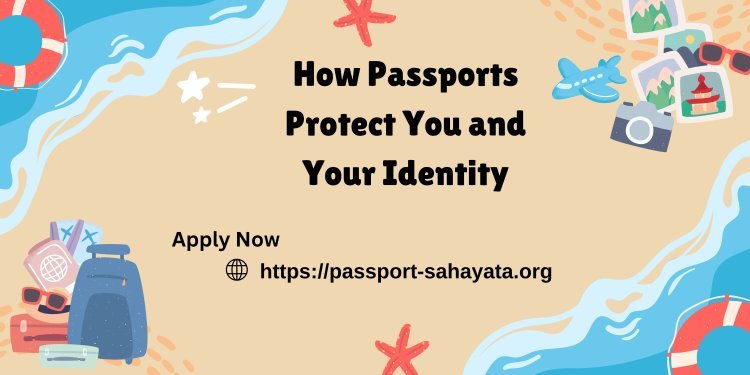How Passports Protect You and Your Identity
A passport is more than just a travel document—it is a vital tool for verifying identity, ensuring national security, and protecting citizens from identity theft and fraud.

Introduction
A passport is more than just a travel document—it is a vital tool for verifying identity, ensuring national security, and protecting citizens from identity theft and fraud. In an era of increasing digital threats, passports incorporate advanced security features such as biometric data, holograms, and encryption to prevent forgery and unauthorized access. These measures safeguard personal information and help maintain a country’s security. Additionally, authentication processes and legal protections further enhance identity verification. To ensure secure international travel and identity protection, individuals must keep their passports updated or apply for passport through the official channels when needed.
The Role of Passports in Identity Protection
1. Official Proof of Identity
A passport serves as an official government-issued document that establishes an individual’s identity and nationality. Unlike other identification documents, such as driver’s licenses or social security cards, passports undergo a more rigorous verification process before issuance. This ensures that the holder's identity is genuine and backed by authoritative records.
2. Biometric Security Features
Modern passports, often referred to as e-passports or biometric passports, contain embedded microchips that store the holder’s biometric data, such as fingerprints, facial recognition data, and iris scans. These biometric features make it nearly impossible for counterfeiters to forge or alter a passport. When traveling, biometric verification at immigration checkpoints ensures that only the rightful owner can use the document.
3. Protection Against Identity Theft
Identity theft is a growing global concern, with criminals attempting to steal personal information for fraudulent purposes. Passports help mitigate this risk through advanced security measures, such as:
- Holograms and Watermarks: These prevent the replication of official passport pages.
- RFID Chips: These chips store encrypted biometric data that is nearly impossible to clone.
- Machine-Readable Zones (MRZs): These allow secure and automated verification of passport data.
By integrating these security measures, passports make it significantly harder for criminals to assume another person's identity.
Travel Security and National Protection
1. Secure International Travel
Passports act as a primary means of identification when traveling internationally. Border security agencies use them to verify travelers' identities and ensure that they do not pose a threat. Enhanced security features in passports prevent forged documents from being used to cross borders illegally.
2. Criminal Background Checks
Many countries cross-check passport data against international crime databases, such as INTERPOL and national security watchlists. This helps prevent criminals, terrorists, or individuals with fraudulent documents from entering a country, thus enhancing global security.
3. Prevention of Human Trafficking and Illegal Immigration
One of the major global concerns is human trafficking and illegal immigration. Passports help combat these crimes by ensuring that individuals travel under their legitimate identities. When authorities verify the authenticity of a passport, they can detect cases of document fraud, child trafficking, and illegal border crossings.
Digital and Electronic Passports
1. E-Passports and Their Advantages
E-passports, introduced in many countries, contain an embedded electronic chip that securely stores personal data. These digital passports provide:
- Faster and more secure processing at immigration checkpoints
- Reduced risk of document forgery or tampering
- Enhanced encryption to protect personal information from cybercriminals
2. Passport Security in the Digital Age
As technology advances, so do threats to personal identity. Digital passports help mitigate risks such as phishing attacks, identity fraud, and document tampering. Many countries now incorporate multi-factor authentication methods to further enhance passport security.
Legal and Governmental Protections
1. Government Oversight and Regulations
Governments worldwide have strict regulations regarding passport issuance, renewal, and security. These include:
- Verification Procedures: Ensuring that applicants provide legitimate proof of identity before issuing a passport.
- Anti-Fraud Measures: Implementing legal penalties for passport forgery or misuse.
- Interagency Cooperation: Sharing passport data between countries to track stolen or lost passports.
2. Lost or Stolen Passport Protection
If a passport is lost or stolen, governments have systems in place to deactivate it, preventing unauthorized use. Citizens are advised to report lost passports immediately so that authorities can update their databases and prevent misuse.
How Individuals Can Protect Their Passports
1. Keep Your Passport Secure
Individuals should take steps to protect their passports by:
- Storing them in a safe place when not in use.
- Using protective covers to prevent physical damage.
- Avoid sharing passport details with unauthorized individuals or online platforms.
2. Report Theft or Loss Immediately
If a passport is lost or stolen, reporting it to local authorities and the passport issuing agency is crucial. Many countries provide emergency passport services to ensure travelers can return home safely.
3. Be Cautious with Online Scams
Cybercriminals often target individuals by sending phishing emails or fake passport renewal websites. Always use official government portals to apply for or renew a passport.
Also read: Passport Agency In Mathura
Conclusion
Passports are indispensable tools for identity verification and protection. Their advanced security features, biometric authentication, and strict legal oversight help prevent identity theft, fraud, and security threats. As technology continues to evolve, passports will remain at the forefront of personal and national security, ensuring that individuals can travel safely and maintain the integrity of their identities. By taking necessary precautions, individuals can further enhance the security of their passports and protect their personal information from potential threats.
What's Your Reaction?















